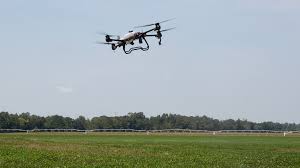Over the past few years, technology has influenced agricultural practices and introduced new ways to ensure efficiency and precision. The most thrilling development has been the use of drones for crop spraying. In Auburn, where agriculture is a crucial sector in the local economy, the application of drone technology can alter farming techniques, boost productivity, and advance sustainability. This blog looks at the benefits and implications of using a drone for spraying crops in Auburn and how this innovation is changing the future of farming.
Drones, or unscrewed aerial vehicles, have become popular across many sectors for their ability to capture high-resolution images and data from the sky. Drones find applications in agriculture as tools for crop monitoring and precision spraying. The integration of this unmanned aerial vehicle technology into farming practices represents one of the essential strides toward far more advanced and efficient methods of managing crops.
Benefits of Employing Drone for Spraying Crops in Auburn
Drones for crop spraying come with various advantages that can transform farming in Auburn:
- More Efficiency: Drones can do this across expansive farmland in just minutes, considerably reducing the time taken to spray compared to other traditional methods. This means that drones’ effectiveness enables a farmer to cope with a larger field and higher application frequency, thereby providing healthy crops and, eventually, good yields.
- Better Precision: One of the most significant advantages lies in precision; drones, with suitable sensors and GPS in place, can be capable of making very accurate applications from point to point without overlap. This results in minimized usage, a factor that will reduce environmental impact and cost.
- Improved Safety: Drones in agriculture avert farmers’ health risks through the manual spraying of chemicals or use from the ground. The drones reduce manual handling and application, which means that risks of exposure are minimized, thus improving safety.
- Savings in Cost: Although the upfront cost of investing in drone technology is generally high, the long-term savings after that are astronomical. Drones reduce the labor and equipment maintenance that conventional spraying demands, decrease the use of chemicals, and decrease crop damage—all these make the spraying process more efficient.
Deploying Drones in Auburn:
Many considerations are involved with making this type of application of drones to agricultural practices applicable for the farmers at Auburn:
- Regulatory Compliance: Farmers must follow a local set of rules and regulations. For instance, in the USA, the administration of drone operations is handled by the Federal Aviation Administration, which has binding licensing and operational restrictions on several aspects. Farmers need to be aware of these so that they don’t run afoul of regulations that could lead to penalties.
- Training and Certification: Operating drones for agricultural purposes will require a professional skill base and special knowledge. Farmers should invest in training and certification programs to ensure safety when using drones. Many organizations offer courses about drone operation, maintenance, and data analysis, which can provide farmers with the expertise to use drone technology effectively.
- Selecting the Right Drone: The appropriate drone for crop spraying depends on the site, crop, and farm specifics. When shopping for a drone, farmers should consider factors such as payload capacity, battery life, and the machine’s skills. To make the best choice based on individual needs, farmers should work with experts or the original equipment manufacturers.
Considerations and Challenges:
While drones offer numerous benefits, they also present several challenges in drone for spraying crops in Auburn:
- Up-front Costs: Procuring and establishing drones may come with relatively high upfront costs; however, the long-term savings and benefits are usually much higher than these upfront investments. Farmers must consider such investments with some view toward return on investment. They can also explore ways in which they could finance the investment.
- Technical Problems: Since drones are nothing more than technology, they can suffer from technical problems. These can range from battery malfunction to software defects. This means that farmers need to take regular care and troubleshoot to minimize downtime and ensure the devices operate effectively.
- Weather Conditions: Weather is a crucial factor affecting the smooth operation of drones; for example, strong winds, rain, or cold temperatures can cause disruptions. Farmers need to monitor weather patterns and schedule drone use accordingly to prevent interruptions and ensure effective spraying.
Conclusion:
Groundbreaking in agricultural technology, like crop-spraying drones, offers the farmers of Auburn improvement over time. Therefore, this is due to effectiveness and preciseness to better safety with an ensuing cost reduction. The farm community will undoubtedly reinforce this trend in the coming years. Hence, this is possible as they adapt and continue to shape agricultural practices in Auburn and beyond. Farmers can use a drone for spraying crops in Auburn. Therefore, this is not only for implementation but also to manage their crops better by overcoming these challenges.
Also Read: Lawyer in Karachi

